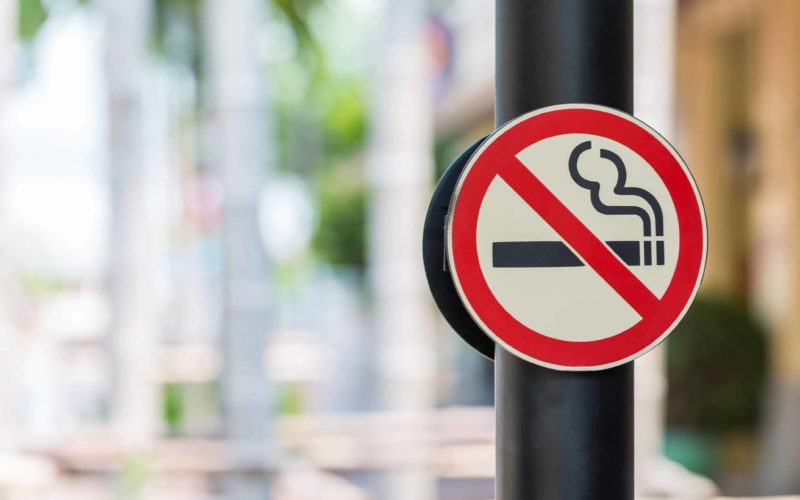Business
New York Gov. Signs Smoking Ban in State-Owned Beaches, Parks

Yes, that means weed, too.
New Yorkers hoping to enjoy a smoke or a toke in one of the state’s beaches or parks might want to think twice.
Kathy Hochul, the state’s Democratic governor, signed a bill into law last month that will prohibit “smoking in all state-owned beaches, boardwalks, marinas, playgrounds, recreation centers, and group camps.”
Those caught smoking in such areas could face a fine of $50.
“Smoking is a dangerous habit that affects not only the smoker but everyone around them, including families and children enjoying our state’s great public places,” Hochul said in a statement following the bill signing last month. “I’m proud to sign this legislation that will protect New Yorkers’ health and help reduce litter in public parks and beaches across the state.”
The new law applies to both tobacco and cannabis.
Recreational pot use has been legal in the Empire State since last year, when former Gov. Andrew Cuomo signed legislation.
The law permitted cannabis use wherever tobacco use is also permitted.
The bill signed into law last month “exempts the Adirondacks and Catskills from the [smoking] ban as well as parking lots, sidewalks adjoining parks, and areas not used for park purposes,” according to the governor’s office.
“Many municipalities and local governments already have restrictions or bans on smoking in public spaces. This additional penalty will enforce a statewide prohibition and includes a fine that will be collected by localities,” Hochul’s office explained in the press release issued last month. “In addition to the health risks posed by secondhand smoke, cigarette butts are a major environmental hazard due to the non-biodegradable filters that are discarded. They are the leading item found during cleanup projects. Through this prohibition, parks and beaches will be kept cleaner and safer as will our local ecosystems.”
The law was celebrated by several New York lawmakers.
“New York’s public parks are family friendly venues. No one, especially children, should be subjected to secondhand smoke while playing on a playground or enjoying the day at a public beach or camp site,” said Democratic state Sen. Toby Ann Stavisky. “Our parks also shouldn’t be tainted by non-biodegradable cigarette butts scattered throughout their grounds. I am proud to sponsor this legislation to protect and improve our beautiful network of parks and I thank Governor Hochul for helping New Yorkers enjoy the beauty of our parks by signing it into law.”
Fellow Democrat Jeffrey Dinowitz, a member of the New York State Assembly, said the law honors the spirit of public greenspace.
“New Yorkers head to our parks for fresh air and to foster a healthy lifestyle. Smoking is the opposite of that. I am very pleased the Governor Hochul has signed into law this important statewide ban on smoking in parks, and thank you to my colleagues for their vital support on this bill over the years,” Dinowitz said last month.
While New Yorkers aged 21 and older have been able to legally possess and use cannabis since last year, the state’s regulated weed market isn’t expected to launch until later this year.
Hochul took over as governor last summer after Cuomo resigned amid allegations of sexual misconduct, and she has taken a proactive role in shaping the state’s nascent legal cannabis industry ever since.
Last month, Hochul announced a $5 million grant in support of cannabis industry job training at New York community colleges.
“New York’s new cannabis industry is creating exciting opportunities, and we will ensure that New Yorkers who want careers in this growing sector have the quality training they need to be successful,” Hochul said in the announcement of the funding. “Diversity and inclusion are what makes New York’s workforce a competitive, powerful asset, and we will continue to take concrete steps to help ensure everyone has the opportunity to participate in the cannabis industry.”
Source: https://hightimes.com/news/new-york-gov-signs-smoking-ban-in-state-owned-beaches-parks/
Business
New Mexico cannabis operator fined, loses license for alleged BioTrack fraud

New Mexico regulators fined a cannabis operator nearly $300,000 and revoked its license after the company allegedly created fake reports in the state’s traceability software.
The New Mexico Cannabis Control Division (CCD) accused marijuana manufacturer and retailer Golden Roots of 11 violations, according to Albuquerque Business First.
Golden Roots operates the The Cannabis Revolution Dispensary.
The majority of the violations are related to the Albuquerque company’s improper use of BioTrack, which has been New Mexico’s track-and-trace vendor since 2015.
The CCD alleges Golden Roots reported marijuana production only two months after it had received its vertically integrated license, according to Albuquerque Business First.
Because cannabis takes longer than two months to be cultivated, the CCD was suspicious of the report.
After inspecting the company’s premises, the CCD alleged Golden Roots reported cultivation, transportation and sales in BioTrack but wasn’t able to provide officers who inspected the site evidence that the operator was cultivating cannabis.
In April, the CCD revoked Golden Roots’ license and issued a $10,000 fine, according to the news outlet.
The company requested a hearing, which the regulator scheduled for Sept. 1.
At the hearing, the CCD testified that the company’s dried-cannabis weights in BioTrack were suspicious because they didn’t seem to accurately reflect how much weight marijuana loses as it dries.
Company employees also poorly accounted for why they were making adjustments in the system of up to 24 pounds of cannabis, making comments such as “bad” or “mistake” in the software, Albuquerque Business First reported.
Golden Roots was fined $298,972.05 – the amount regulators allege the company made selling products that weren’t properly accounted for in BioTrack.
The CCD has been cracking down on cannabis operators accused of selling products procured from out-of-state or not grown legally:
- Regulators alleged in August that Albuquerque dispensary Sawmill Sweet Leaf sold out-of-state products and didn’t have a license for extraction.
- Paradise Exotics Distro lost its license in July after regulators alleged the company sold products made in California.
Golden Roots was the first alleged rulebreaker in New Mexico to be asked to pay a large fine.
Source: https://mjbizdaily.com/new-mexico-cannabis-operator-fined-loses-license-for-alleged-biotrack-fraud/
Business
Marijuana companies suing US attorney general in federal prohibition challenge

Four marijuana companies, including a multistate operator, have filed a lawsuit against U.S. Attorney General Merrick Garland in which they allege the federal MJ prohibition under the Controlled Substances Act is no longer constitutional.
According to the complaint, filed Thursday in U.S. District Court in Massachusetts, retailer Canna Provisions, Treevit delivery service CEO Gyasi Sellers, cultivator Wiseacre Farm and MSO Verano Holdings Corp. are all harmed by “the federal government’s unconstitutional ban on cultivating, manufacturing, distributing, or possessing intrastate marijuana.”
Verano is headquartered in Chicago but has operations in Massachusetts; the other three operators are based in Massachusetts.
The lawsuit seeks a ruling that the “Controlled Substances Act is unconstitutional as applied to the intrastate cultivation, manufacture, possession, and distribution of marijuana pursuant to state law.”
The companies want the case to go before the U.S. Supreme Court.
They hired prominent law firm Boies Schiller Flexner to represent them.
The New York-based firm’s principal is David Boies, whose former clients include Microsoft, former presidential candidate Al Gore and Elizabeth Holmes’ disgraced startup Theranos.
Similar challenges to the federal Controlled Substances Act (CSA) have failed.
One such challenge led to a landmark Supreme Court decision in 2005.
In Gonzalez vs. Raich, the highest court in the United States ruled in a 6-3 decision that the commerce clause of the U.S. Constitution gave Congress the power to outlaw marijuana federally, even though state laws allow the cultivation and sale of cannabis.
In the 18 years since that ruling, 23 states and the District of Columbia have legalized adult-use marijuana and the federal government has allowed a multibillion-dollar cannabis industry to thrive.
Since both Congress and the U.S. Department of Justice, currently headed by Garland, have declined to intervene in state-licensed marijuana markets, the key facts that led to the Supreme Court’s 2005 ruling “no longer apply,” Boies said in a statement Thursday.
“The Supreme Court has since made clear that the federal government lacks the authority to regulate purely intrastate commerce,” Boies said.
“Moreover, the facts on which those precedents are based are no longer true.”
Verano President Darren Weiss said in a statement the company is “prepared to bring this case all the way to the Supreme Court in order to align federal law with how Congress has acted for years.”
While the Biden administration’s push to reschedule marijuana would help solve marijuana operators’ federal tax woes, neither rescheduling nor modest Congressional reforms such as the SAFER Banking Act “solve the fundamental issue,” Weiss added.
“The application of the CSA to lawful state-run cannabis business is an unconstitutional overreach on state sovereignty that has led to decades of harm, failed businesses, lost jobs, and unsafe working conditions.”
Business
Alabama to make another attempt Dec. 1 to award medical cannabis licenses

Alabama regulators are targeting Dec. 1 to award the first batch of medical cannabis business licenses after the agency’s first two attempts were scrapped because of scoring errors and litigation.
The first licenses will be awarded to individual cultivators, delivery providers, processors, dispensaries and state testing labs, according to the Alabama Medical Cannabis Commission (AMCC).
Then, on Dec. 12, the AMCC will award licenses for vertically integrated operations, a designation set primarily for multistate operators.
Licenses are expected to be handed out 28 days after they have been awarded, so MMJ production could begin in early January, according to the Alabama Daily News.
That means MMJ products could be available for patients around early March, an AMCC spokesperson told the media outlet.
Regulators initially awarded 21 business licenses in June, only to void them after applicants alleged inconsistencies with how the applications were scored.
Then, in August, the state awarded 24 different licenses – 19 went to June recipients – only to reverse themselves again and scratch those licenses after spurned applicants filed lawsuits.
A state judge dismissed a lawsuit filed by Chicago-based MSO Verano Holdings Corp., but another lawsuit is pending.
Source: https://mjbizdaily.com/alabama-plans-to-award-medical-cannabis-licenses-dec-1/
-

 Business2 years ago
Business2 years agoPot Odor Does Not Justify Probable Cause for Vehicle Searches, Minnesota Court Affirms
-

 Business2 years ago
Business2 years agoNew Mexico cannabis operator fined, loses license for alleged BioTrack fraud
-

 Business2 years ago
Business2 years agoAlabama to make another attempt Dec. 1 to award medical cannabis licenses
-

 Business2 years ago
Business2 years agoWashington State Pays Out $9.4 Million in Refunds Relating to Drug Convictions
-

 Business2 years ago
Business2 years agoMarijuana companies suing US attorney general in federal prohibition challenge
-

 Business2 years ago
Business2 years agoLegal Marijuana Handed A Nothing Burger From NY State
-

 Business2 years ago
Business2 years agoCan Cannabis Help Seasonal Depression
-

 Blogs2 years ago
Blogs2 years agoCannabis Art Is Flourishing On Etsy











